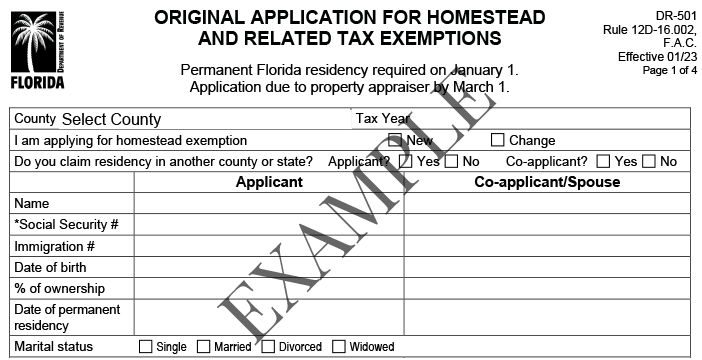Florida’s Homestead Laws offer substantial protection to residents. The Florida Homestead Exemption provides creditor protection, tax benefits, and transfer restrictions. The Homestead Exemption only applies to ONE, primary residence. You may have other homes: however, only one may be used under the Homestead Exemption.
The Constitutional Homestead Exemption is different from the homestead tax exemption. There is no need to file documents for the Homestead Exemption. Tax exemption rules are different and require paperwork.
It’s important to note that information within this page can help guide someone in the right direction and answer general questions; however, this is not a substitute for professional legal advice. Consulting with an attorney for probate is not only advised, but in many cases, required in the State of Florida
Creditor Protection
Florida’s Homestead Laws are deeply rooted in the state’s constitution, specifically Article X, Section 4. This provision states, “There shall be exempt from forced sale under process of any court, and no judgment, decree, or execution shall be a lien thereon, except for the payment of taxes and assessments thereon, obligations contracted for the purpose, improvement, or repair thereof, or obligations contracted for house, field, or other labor performed on realty, the following property owned by a natural person.” So, even when a homeowner faces financial hardship, or legal troubles, creditors may not take away their home.
As a result, if someone threatens to take your home contact an experienced attorney immediately to protect your rights.
Qualifications for Homestead Protection

Florida’s Homestead Laws offer great protection. That being said, a person must meet certain criteria to qualify for these safeguards. Criteria include:
- Primary Residence: The Florida home must be your primary residence. You may own a home in another state such as Michigan; but, that must be your second home. In other words, you may not use the homestead protection on both homes. So, if your Florida home is a vacation home, then, it does not qualify for homestead protection.
- Ownership: The home must be owned by a natural person, not an LLC, or a business entity.
- Acreage Limit: Urban properties may not exceed half an acre. Rural properties have a limit of 160 acres.
- Declaration of Homestead: You may file this document with the assessor’s office.
- Restrictions on Alienation: If you are facing financial difficulties talk to your attorney before selling the property. Homestead Protection may be lost if you attempt to sell under certain circumstances.
- Adding a co-owner: Check with your attorney before doing this. You may lose homestead protections if the co-owner does not live on the property. Various legal scenarios may jeopardize your ownership.
Florida Homestead Exemption Exceptions
Florida’s Homestead Exemption offers great protection from creditors. However, all debts are not protected under the Exemption Laws. There are several exceptions:
- Federal, State, and Local Taxes- Government taxes including property taxes must be paid. Tax liens may be placed on your home for failure to pay taxes.
- Mortgages and Home Equity Loans- These loans must be paid or the creditor may foreclose on your home.
- Mechanic’s Liens- If you have a high repair bill, the mechanic may have a lien placed on your property.
- Homeowner’s Association Dues- Your Homeowner’s Association will place a lien on your home if you fail to pay your dues. This must be paid when you sell your home.
- Student Loans- Student loans are not protected by Homestead Laws. They must be paid back.
- Child and Spousal Support- Your home is not protected from unpaid child or spousal support.
- Certain Judgements- Some judgements involving criminal activity may not be covered by the Homestead Protections. Depending on the case, you could lose your home. All legal matters should be handled by an experienced attorney.
Homestead Tax Exemption
In addition to protection from creditors, Homestead Laws offer property tax benefits. To apply for the tax exemption follow these steps:
- Determine eligibility- Have you been a legal Florida resident since January 1 of this year? The property must be your primary residence as of January 1.
- Gather necessary documents
- Florida driver’s license or state ID card
- Proof of residency-utility bills, voter registration, vehicle registrations
- Deed or title to the property
- Social security numbers of all owners
- File application in county property appraiser’s office.
The tax exemption should take effect next year. Of course, each county may have different requirements. So, it remains advisable to check with your county’s assessor’s office before starting this process. If you have any problems, contact an experienced attorney.
